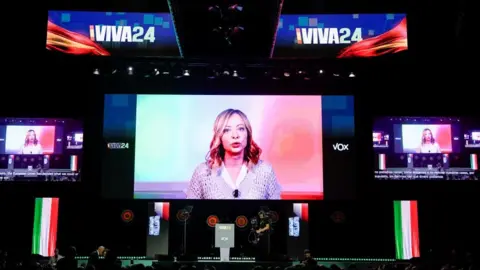 REUTERS/Ana Beltran
REUTERS/Ana Beltran
Italy’s Giorgia Meloni wants to repeat her domestic success on a European scale
Far-right parties are on the rise in much of Europe, and Italian Prime Minister Giorgia Meloni senses a big moment.
“We are on the eve of a decisive election,” the Brothers of Italy leader tells a packed hall in Madrid by video link. Marine Le Pen of France’s National Rally is in the front row, alongside Santiago Abascal, who heads Spain’s Vox party. “We are the engine of our continent’s renaissance,” the Italian prime minister declares, before rousing her audience to a standing ovation.
The far right has won elections in Italy and the Netherlands, leads the polls in France, Austria and Belgium and has a stake in the governments of Finland and Slovakia.
Now they could secure more than three in every 10 votes when the EU’s 27 states vote in European elections from 6-9 June, and become a powerful force in the European Parliament.
Infighting is threatening to take the gloss off the far-right surge – because of a series of scandals surrounding Germany’s AfD.
That is why the AfD’s allies in the EU have thrown the German party out of their far-right Identity and Democracy (ID) group in the European Parliament.
They want nothing to do with a party whose top candidate, Maximilian Krah, has revealed embarrassing views about Adolf Hitler’s Waffen-SS and whose number two faces accusations of taking money from Vladimir Putin’s Russia – allegations he denies.
That kind of association is the last thing Marine Le Pen needs. She has fought for years to detoxify her party from the extreme views of her father, who founded National Rally’s predecessor and was convicted of trivialising the Holocaust.

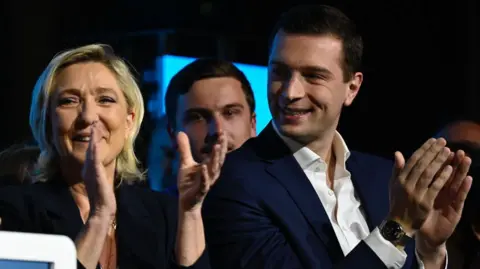 JEAN-CHRISTOPHE VERHAEGEN/AFP
JEAN-CHRISTOPHE VERHAEGEN/AFP
Marine Le Pen’s National Rally is now led by Jordan Bardella, its top candidate in the EU election
Her party now stands at around 30% in the polls and she is favourite to become France’s next president in 2027.
The far right’s biggest success story in Europe, Giorgia Meloni, has big hopes too. Her ambition is to create a right-wing force that will take charge in Brussels.
“They will have many more people [in Parliament] and these people will be mainstreamed or normalised by their presence,” says Sabine Volk, a close observer of the far right at the University of Passau in Germany.
If Ms Meloni’s EU grouping, the European Conservatives and Reformists (ECR), does well in the elections there is a chance they could find common ground with the centre right of European Commission President Ursula von der Leyen.
Ms von der Leyen’s European People’s Party is likely to end up as the biggest group and she has left the door open to an alliance with the ECR as long as they are pro-Europe, pro-Ukraine and in favour of rule of law.
The ECR includes not only Brothers of Italy, but also Poland’s right-wing populist opposition party, Law and Justice, Spain’s Vox, Riikka Purra’s Finns Party – part of the Finnish government – and Jimmy Akesson’s Sweden Democrats, who work with the Swedish government without being in it.

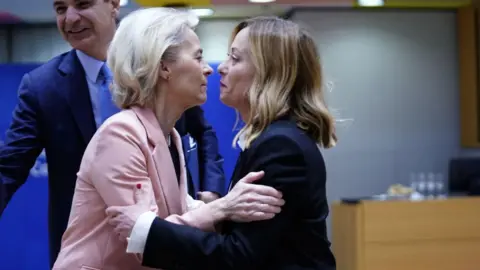 Pier Marco Tacca/Getty Images
Pier Marco Tacca/Getty Images
Ursula von der Leyen (L) has built up a strong working relationship with the Italian leader
It is hard to imagine them all signing up to Ursula von der Leyen’s demands, especially when some centre-right parties in her group would not even countenance such an alliance. But if they did, then the European Parliament could steer policy in dramatically different directions, on green policies, migration and asylum.
If the two far-right groupings – ECR and ID – were to somehow overcome their internal differences, then they could form a powerful bloc too.
Sabine Volk is very doubtful of “one mega-coalition” of far-right parties, as is Matthias Dilling, a European politics specialist at Swansea University.
“The far right in Europe has had a history of division,” he says. “I don’t know whether we would see a single far right group as they continue to be, internally, fairly heterogeneous.”
The ID group, which is home to France’s National Rally, also includes Italy’s League, Austria’s Freedom Party (FPÖ), Geert Wilders’ Freedom Party in the Netherlands, Belgium’s Vlaams Belang and the Danish People’s Party.
What does far right mean?
Opinions differ on what makes a party far-right, but Marine Le Pen, like Mr Wilders, objects to the label.
Dutch political scientist Cas Mudde – perhaps the best-known observer of Europe’s far right – says at its core it combines nativism, authoritarianism, and populism. He defines nativism as a “xenophobic form of nationalism”.
While France’s National Rally and Brothers of Italy have worked hard to shed the far-right label, Matthias Dilling says Cas Mudde’s three pillars are “very clearly present” in both parties.
Sabine Volk says policies on immigration and anti-feminism often tie far-right movements together. Some parties might back gender equality, but ideally would prefer women to stay at home, she argues.
Brothers of Italy recently pushed through a law allowing anti-abortion groups into abortion clinics to try to stop women terminating pregnancies.
Although some commentators see Hungary’s ruling nationalist-conservative Fidesz party as far-right, they are not in either far-right grouping.
Most far-right parties have traditionally sought to challenge the EU as a supranational force, and many still do.
But Ms Meloni’s party has left behind its “once vehement opposition to Brussels”, says Prof Leila Simona Talani of King’s College London. Her European Election manifesto says “we want Europe to be a political giant with a leading role internationally”.

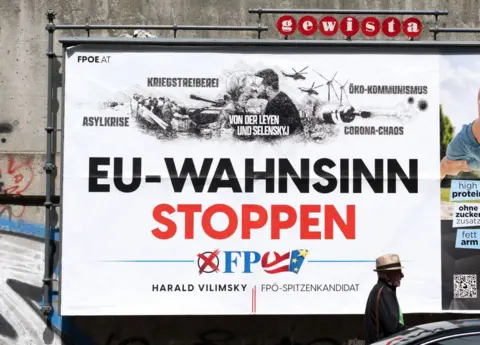 JOE KLAMAR/AFP
JOE KLAMAR/AFP
Austria’s Freedom Party leads the polls with its slogan to “Stop EU madness”
Meanwhile, Austria’s Freedom Party (FPÖ) is fighting its election campaign on the slogan “Stop EU madness”, against a backdrop of Volodymyr Zelensky kissing the president of the European Commission and buzz phrases such as “asylum crisis”, “eco-communism” and “corona-chaos”.
Despite a succession of national scandals, FPÖ leader Herbert Kickl is leading the EU election polls and could win national elections in the autumn.
Eurosceptic rhetoric remains widespread on the far right, but there is less talk now of leaving the EU.

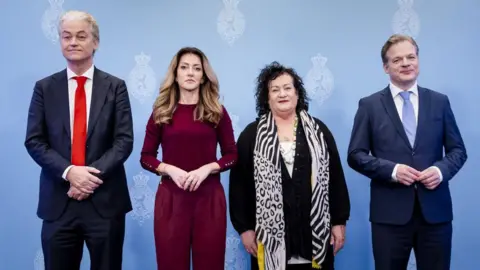 KOEN VAN WEEL/ANP/AFP
KOEN VAN WEEL/ANP/AFP
Geert Wilders (L) has reached a coalition deal with three Dutch party leaders
Geert Wilders’ Freedom Party did back a Dutch “Nexit” referendum to leave the EU but now says: “I see there’s no longer support for a Nexit in the Netherlands”.
The same goes for The Finns Party, which does not actively seek a Finnish exit, or “Fixit” from the EU any more: “It is not realistic that Finland would unilaterally leave the EU” in the near future, it says.
Sweden Democrats leader Jimmie Akesson has not dropped the idea completely, and wants to remove Sweden’s EU membership from its constitution.
Marine Le Pen has never been a fan of the EU either, but she no longer talks of leaving it. She has sought to accuse its officials of “promoting Islamism and wokeism” and of seeking to scrap Europe’s borders. Her party is now led by Jordan Bardella, who is number one on the EU election list. But a former boss of the EU’s Frontex border agency, Fabrice Leggeri, is at number three.
How this patchwork of nationalist politics plays out in the European Parliament after the votes on 6-9 June is hard to predict.
But the parties on the far right are far better organised than before, as the Madrid rally showed. Even Argentina’s President Javier Milei was there.
“It’s part of a long trajectory [for the far right] to form international ties and international networks,” says Matthias Dilling.
The question is whether they have the same ambition as Giorgia Meloni.
“I want to try something that’s not easy but fascinating, to repeat in Europe what we’ve achieved in Italy,” she told Italian TV.
Source link: https://www.bbc.com/news/articles/cgllgxlg5dgo

